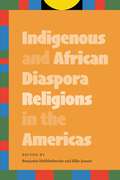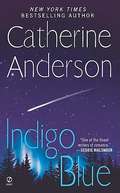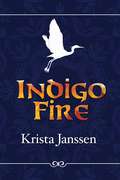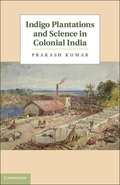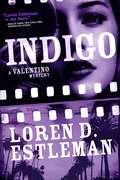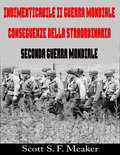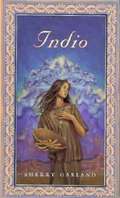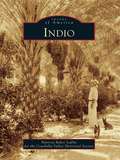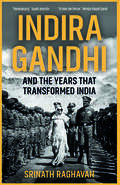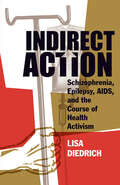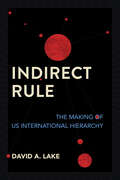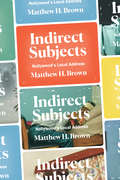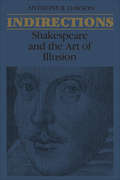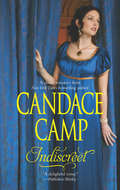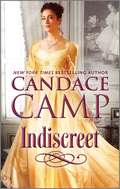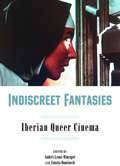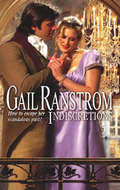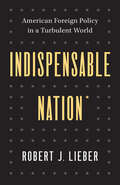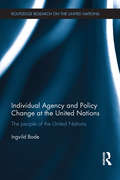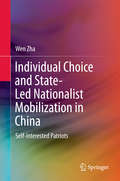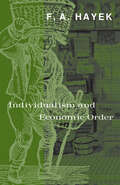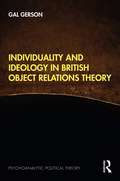- Table View
- List View
Indigenous and African Diaspora Religions in the Americas
by Silke Jansen Benjamin HebblethwaiteIndigenous and African Diaspora Religions in the Americas explores spirit-based religious traditions across vast geographical and cultural expanses, including Canada, the United States, Haiti, the Dominican Republic, Cuba, Trinidad and Tobago, Mexico, Brazil, and Chile. Using interdisciplinary research methods, this collection of original perspectives breaks new ground by examining these traditions as typologically and historically related. This curated selection of the traditions allows readers to compare and highlight convergences, while the description and comparison of the traditions challenges colonial erasures and expands knowledge about endangered cultures. The inclusion of spirit-based traditions from a broad geographical area emphasizes the typology of religion over ethnic compartmentalization. The individuals and communities studied in this collection serve spirits through rituals, song, instruments, initiation, embodiment via possession or trance, veneration of nature, and, among some Indigenous people, the consumption of ritual psychoactive entheogens. Indigenous and African diaspora practices focused on service to ancestors and spirits reflect ancient substrates of religiosity. The rationale to separate them on disciplinary, ethnic, linguistic, geographical, or historical grounds evaporates in our interconnected world. Shared cultural, historical, and structural features of American indigenous and African diaspora spirit-based traditions mutually deserve our attention since the analyses and dialogues give way to discoveries about deep commonalities and divergences among religions and philosophies. Still struggling against the effects of colonialism, enslavement, and extinction, the practitioners of these spirit-based religious traditions hold on to important but vulnerable parts of humanity&’s cultural heritage. These readings make possible journeys of recognition as well as discovery.
Indigo Blue
by Catherine AndersonBack in print after more than ten years. Torn between the white and Comanche worlds of her parents, Indigo Wolf has grown up estranged from the townspeople of Wolf's Landing, Orgeon. Bo one understands her elusive spirit-until Jake Rand comes to town to act as foreman of her family's ranch. But Jake's real motives are as secret as his true identity, and as personal as his growing attraction to Indigo. .
Indigo Fire
by Krista JanssenA boldly independent woman, Eden Palmer must save her family's indigo plantation from reverting to the English crown. She sails to Barbados and cuts a bargain with a former buccaneer to buy his secret for growing a profitable crop. She cajoles a handsome Swiss captain to take her and her plants on his ship, and is soon irresistibly drawn to his power and courage. Baron Derek von Walden is sailing with his Swiss colonists to claim property in South Carolina when he is persuaded to carry indigo plants by a spirited young lady. He is stunned to learn that his plantation boundaries overlap hers. Tormented by a tragic past, Derek begins to find healing love with Eden, but their glorious passion is challenged from all quarters as their destiny unfolds.
Indigo Plantations and Science in Colonial India
by Prakash KumarPrakash Kumar documents the history of agricultural indigo, exploring the effects of nineteenth-century globalisation on this colonial industry. Charting the indigo culture from the early modern period to the twentieth century, Kumar discusses how knowledge of indigo culture thrived among peasant traditions on the Indian subcontinent in the early modern period and was then developed by Caribbean planters and French naturalists who codified this knowledge into widely disseminated texts. European planters who settled in Bengal with the establishment of British rule in the late eighteenth century drew on this information. From the nineteenth century, indigo culture became more modern, science-based and expert driven, and with the advent of a cheaper, purer synthetic indigo in 1897, indigo science crossed paths with the colonial state's effort to develop a science for agricultural development. Only at the end of the First World War, when the industrial use of synthetic indigo for textile dyeing and printing became almost universal, did the indigo industry's optimism fade away.
Indigo: A Valentino Mystery (Valentino Mysteries #6)
by Loren D. EstlemanIndigo is a brand new Valentino novel from Harlan Coben's hero, Loren D. Estleman! Film detective Valentino is summoned to the estate of Ignacio Bozel to collect a prized donation to the university’s movie library: Bleak Street, a film from the classic noir period, thought lost for more than sixty years.Bleak Street was never released. Its star, Van Oliver, a gifted and charismatic actor with alleged ties to the mob, disappeared while the project was in post-production, presumably murdered by gangland rivals: another one of Hollywood’s unsolved mysteries. Studio bosses elected to shelve the film rather than risk box-office failure. UCLA’s PR Department is excited about the acquisition, but only if Valentino can find a way to sell it in the mainstream media by way of a sensational discovery to coincide with its release: “We want to know what happened to Oliver.”A simple quest for a few hundred yards of celluloid opens a portal into a place darker than night.At the Publisher's request, this title is being sold without Digital Rights Management Software (DRM) applied.
Indimenticabile II Guerra Mondiale: Conseguenze della Straordinaria Seconda Guerra Mondiale
by Valeria Ciccotti Scott S. F. MeakerLa guerra ha sempre avuto la tradizione di cambiare la mappa sociale ed economica di una nazione. Il concetto di famiglia venne completamente distrutto con la diffusa devastazione della Seconda Guerra Mondiale. Questo libro segue l'esperienza di sei persone appartenenti a vari settori, coinvolte in questo conflitto globale, e nelle conseguenze della straordinaria Seconda Guerra Mondiale.
Indio
by Sherry GarlandTeenage Ipa struggles to survive a brutal time of change as the Spanish begin the conquest of the native people along the Texas border.
Indio (Images of America)
by Patricia Baker Laflin Coachella Valley Historical SocietyLocated halfway between Los Angeles and Yuma, Arizona, Indio came into being as a railroad town in 1876 when the Southern Pacific Railroad completed this last link in its southern transcontinental route. Settling this arid land took ingenuity and courage, and Indio's early residents had both. In the 1930s, Indio became a mining town when 92 miles of tunnel were dug through its eastern mountains for the Los Angeles Aqueduct, the largest construction project in the United States during the Depression. World War II brought Gen. George Patton's Desert Tank Corps to train nearby and crowd into Indio for rest and relaxation. The completion of the Coachella Branch of the All-American Canal brought Colorado River water to the desert in the late 1940s, and a land boom ensued. Today Indio's reputation as the "Date Capital of the United States" and "City of Festivals" is long held and well deserved.
Indira Gandhi and the Years that Transformed India
by Srinath RaghavanThe gripping story of Indira Gandhi&’s premiership—and the profound influence she had on India Indira Gandhi&’s ascent as prime minister of India in 1966 was entirely unforeseen. But she soon emerged as one of the most powerful political leaders of her times, who transformed the world&’s largest democracy. She served as prime minister for a remarkable fifteen years, leaving behind a complex and deeply controversial legacy. In this fascinating account, Srinath Raghavan tells the story of Indira Gandhi&’s political career and the momentous changes that India experienced under her leadership. From her tentative start in high office to her remarkable electoral victories, the dark days of the Emergency of 1975–77, and her assassination at the hands of her bodyguards in 1984, Raghavan sheds new light on her politics and government, as well as on her adversaries and critics. He shows how the 1970s were the hinge on which the history of the country turned—and how Indira Gandhi transformed the new postcolonial nation into the India of today.
Indirect Action: Schizophrenia, Epilepsy, AIDS, and the Course of Health Activism
by Lisa DiedrichThe experience of illness (both mental and physical) figures prominently in the critical thought and activism of the 1960s and 1970s, though it is largely overshadowed by practices of sexuality. Lisa Diedrich explores how and why illness was indeed so significant to the social, political, and institutional transformation beginning in the 1960s through the emergence of AIDS in the United States. A rich intervention—both theoretical and methodological, political and therapeutic—Indirect Action illuminates the intersection of illness, thought, and politics.Not merely a revision of the history of this time period, Indirect Action expands the historiographical boundaries through which illness and health activism in the United States have been viewed. Diedrich explores the multiplicity illness–thought–politics through an array of subjects: queering the origin story of AIDS activism by recalling its feminist history; exploring health activism and the medical experience; analyzing psychiatry and self-help movements; thinking ecologically about counterpractices of generalism in science and medicine; and considering the experience and event of epilepsy and the witnessing of schizophrenia. Indirect Action places illness in the leading role in the production of thought during the emergence of AIDS, ultimately showing the critical interconnectedness of illness and political and critical thought.
Indirect Rule: The Making of US International Hierarchy
by David A. LakeIndirect Rule examines how states indirectly exercise authority over others and how this mode of rule affects domestic and international politics. Indirect rule has long characterized interstate relationships and US foreign relations. A key mechanism of international hierarchy, indirect rule involves an allied group within a client state adopting policies preferred by a dominant state in exchange for the dominant state's support. Drawing on the history of US involvement in the Caribbean and Central America, Western Europe, and the Arab Middle East, David A. Lake shows that indirect rule is more likely to occur when the specific assets at risk are large and governance costs are low. Lake's conceptualization of indirect rule sharpens our understanding of how the United States came to occupy the pinnacle of world power. Yet the consequences of indirect rule he documents—including anti-Americanism—reveal its shortcomings. As US efforts at democracy promotion and other forms of intervention abroad face declining support at home, Indirect Rule compels us to consider whether this method of rule ultimately advances US interests.
Indirect Subjects: Nollywood's Local Address
by Matthew H. BrownIn Indirect Subjects, Matthew H. Brown analyzes the content of the prolific Nigerian film industry's mostly direct-to-video movies alongside local practices of production and circulation to show how screen media play spatial roles in global power relations. Scrutinizing the deep structural and aesthetic relationship between Nollywood, as the industry is known, and Nigerian state television, Brown tracks how several Nollywood films, in ways similar to both state television programs and colonial cinema productions, invite local spectators to experience liberal capitalism not only as a form of exploitation but as a set of expectations about the future. This mode of address, which Brown refers to as “periliberalism,” sustains global power imbalances by locating viewers within liberalism but distancing them from its processes and benefits. Locating the wellspring of this hypocrisy in the British Empire's practice of indirect rule, Brown contends that culture industries like Nollywood can sustain capitalism by isolating ordinary African people, whose labor and consumption fuel it, from its exclusive privileges.
Indirections: Shakespeare and the Art of illusion
by Anthony DawsonThe precise relation between the spectator and the work of art was a matter of great interest to late Renaissance and baroque artists, playwrights as well as painters. In Shakespeare's plays the relation between audience and stage life is crucial. The plays constantly remind the audience of the complex fictiveness of their experience yet they also project a reality specifically through illusion. Indirections is a study of twelve plays in which Shakespeare sets up situations and relationships between the characters analogous to the relationship established between audience and play. This book examines the varied uses of illusion, deceit, disguise, and manipulation in the plays, both comedies and tragedies, and traces Shakespeare's use of illusion through his career — from the buoyant optimism of the great comedies and the ambiguity of the middle years to the new richness and power in the romances. Dawson suggests that the way characters respond to illusory situations sets up a model for the way audiences are meant to respond to the play themselves. Such action at least initially establishes a basis for the movement of characters from self-delusion to self-knowledge. This process of self-realization enables the characters to distinguish truth from appearance, love from infatuation; and significantly, it is a direct result of involvement with illusion and role-playing. It is as if the characters must arrive, within the movement of the plot, at an understanding of, and response to, the nature of drama itself parallel to the audience's experience of the play as a whole. This subtle interplay between audience and characters, where each in a sense represents the other, depends for its life on the physical and psychic distances created by the theatre.
Indiscreet
by Candace CampBenedict Wincross appears in Camilla Ferrand's life as quickly as the gunfire pursuing him. Though his name belies the fact, he is obviously no gentleman. But Camilla realizes Benedict may be just what she needs: a temporary fiancé to satisfy her family's worries.And Benedict needs something in return: an entrée into Chevington Park, Camilla's estate, to conduct an undercover investigation into corruption-without Camilla's knowledge. Each was drawing the other into a dangerous deceit-for even if they survived the danger of Benedict's mission, how would they undo the love between them?
Indiscreet (Mills And Boon M&b Ser.)
by Candace CampA rollicking historical adventure from New York Times bestselling author Candace Camp, originally published in 1997.Benedict Wincross appears in Camilla Ferrand’s life as quickly as the gunfire pursuing him. Though he is obviously no gentleman, Camilla realizes Benedict may be just what she needs: a temporary fiancé to satisfy her family’s worries.And Benedict needs something in return: an entrée into Chevington Park, Camilla’s estate, to conduct an undercover investigation into corruption—without Camilla’s knowledge. Each is drawing the other into a dangerous deceit—for even if they survive the danger of Benedict’s mission, what will they do about the love that’s grown between them?
Indiscreet Fantasies: Iberian Queer Cinema (Campos Ibéricos: Bucknell Studies in Iberian Literatures and Cultures)
by Kelly Moore Joan Ramon Resina Ann Davies Jennifer Brady William Viestenz Nina L Molinaro Ana Corbalán Meredith Lyn Jeffers Darío Sánchez González Ibon Izurieta María Teresa Vera-Rojas Rui Trindade OliveiraPedro Almódovar may have helped put queer Iberian cinema on the map, but there are also multitudes of other LGBTQ filmmakers from Catalonia, Portugal, Castile, Galicia, and the Basque Country who have made the Peninsula one of the world’s most vital sources for queer film. Together, they have produced a cinema whose expressions of queer desire have challenged the region’s conservative religious and family values, while intervening in vital debates about politics, history, and nation. <P><P> Iberian Queer Cinema is a unique collection that offers in-depth analyses of fifteen different films, each by a different director, produced in the region over the past fifty years, from Narciso Ibáñez Serrador’s La residencia (The House That Screamed, 1970) to João Pedro Rodrigues’ O ornitólogo (The Ornithologist, 2016). Together, they show how queer Iberian cinema has responded to historical traumas ranging from the AIDS crisis to the repressive and homophobic Franco regime. Yet they also explore how these films gesture towards a more fluid understanding of sexuality, gender, and national identity. This book will thus give readers a new appreciation for both the cultural diversity of Iberia and the richness of its moving and thought-provoking queer cinema. <P><P> Published by Bucknell University Press. Distributed worldwide by Rutgers University Press.
Indiscretions
by Gail RanstromTropical heat...burning passionDaphne had sacrificed everything to remain unknown in her tropical paradise. But if Lord Lockwood recognized the woman who had fled England with a crime on her conscience, nothing could keep her safe....Even the thought of future punishment could not dampen present desire. Lockwood's lips reawakened the passionate woman she had once been. What harm, Daphne reasoned, could come from one stolen kiss? Still, she could not allow her feelings to overpower her sense-it was too dangerous. She'd denied herself for five years. Surely she could deny Lockwood for a few weeks?
Indispensable Nation: American Foreign Policy in a Turbulent World
by Robert J. LieberA clear-eyed analysis of the role the United States should play in the world as it exists today The United States remains &“the indispensable nation.&” In this book, the distinguished international relations theorist and foreign policy specialist Robert Lieber argues that in a world full of revisionist powers, America&’s role is more important than ever. No other country is capable of playing that role. America remains the essential pillar of the postwar liberal order. It is a center of both political and financial stability, and it promotes important values that the revisionist powers do not. Not beholden to any particular theory, this is a clear-eyed analysis of the role the United States should play in the world as it exists today.
Individual Agency and Policy Change at the United Nations: The People of the United Nations (Routledge Research on the United Nations (UN))
by Ingvild BodeThis book highlights how temporary international civil servants play a crucial role in initiating processes of legal and institutional change in the United Nations system. These individuals are the “missing” creative elements needed to fully understand the emergence and initial spread of UN ideas such as human development, sovereignty as responsibility, and multifunctional peacekeeping. The book: Shows that that temporary UN officials are an actor category which is empirically crucial, yet usually neglected in analytical studies of the UN system. Focussing on these particular individual actors therefore allows for a better understanding of complex UN decision-making. Demonstrates how these civil servants matter, looking at what their agency is based on. Offering a new and distinctive model, Bode seeks to move towards a comprehensive conceptualisation of individual agency, which is currently conspicuous for its absence in many theoretical approaches that address policy change Uses three key case studies of international civil servants (Francis Deng, Mahbub ul Haq and Marrack Goulding) to explore the possibilities of this specific group of UN individuals to act as agents of change and thereby test the prevailing notion that international bureaucrats can only act as agents of the status quo. This book will be of great interest to students and scholars of international organizations and the United Nations.
Individual Choice and State-Led Nationalist Mobilization in China
by Wen ZhaThis book presents a comparative historical analysis of state-led nationalist movements in Chinese history, which counters current claims that popular nationalism in present-day China is strong enough to sustain costly expansionist wars. Popular nationalism in China has been on the rise since the early 1990s to the concern of many observers. Some have even asked whether China will become another Germany. A comparative historical analysis of pre-war and wartime nationalist mobilization helps us better understand how individuals formulate their opinions under extreme conditions. It concludes that the public's weak perception of foreign threats, taken together with pro-minority domestic institutions, may significantly undermine the state's efforts at nationalist mobilization and thus limit its capability to pursue external expansion or other strategic goals.
Individual Rights and the Making of the International System
by Christian Reus-SmitWe live today in the first global system of sovereign states in history, encompassing all of the world's polities, peoples, religions and civilizations. Christian Reus-Smit presents a new account of how this system came to be, one in which struggles for individual rights play a central role. The international system expanded from its original European core in five great waves, each involving the fragmentation of one or more empires into a host of successor sovereign states. In the most important, associated with the Westphalian settlement, the independence of Latin America, and post-1945 decolonization, the mobilization of new ideas about individual rights challenged imperial legitimacy, and when empires failed to recognize these new rights, subject peoples sought sovereign independence. Combining theoretical innovation with detailed historical case studies, this book advances a new understanding of human rights and world politics, with individual rights deeply implicated in the making of the global sovereign order.
Individual Rights: The Blessings of Liberty
by Perfection LearningWHAT PREVENTS TYRANNY?<P> The question above is the essential question that you will consider as you read this book. The selections, activities, and organization of the book will lead you to think critically about this question and to develop a deeper understanding of how effectively the Constitution, Bill of Flights, and other amendments guard individual liberties.<P> Included are sections on:<P> * How would society be different without the First Amendment? <P> * How well does federalism protect individual rights? <P> * Why are suspects' rights important?<P> * Thinking on Your Own
Individual and Community in Nietzsche's Philosophy
by Julian YoungAccording to Bertrand Russell, Nietzsche's only value is the flourishing of the exceptional individual. The well-being of ordinary people is, in itself, without value. Yet there are passages in Nietzsche that appear to regard the flourishing of the community as a whole alongside, perhaps even above, that of the exceptional individual. The ten essays that comprise this volume wrestle with the tension between individual and community in Nietzsche's writings. Some defend a reading close to Russell's. Others suggest that Nietzsche's highest value is the flourishing of the community as a whole and that exceptional individuals find their highest value only in promoting that flourishing. In viewing Nietzsche from the perspective of community, the essays also cast new light on other aspects of his philosophy, for instance, his ideal of scientific research and his philosophy of language.
Individualism and Economic Order
by F. A. Hayek“These essays . . . bring great learning and . . . intelligence to bear upon economic and social issues of central importance to our era.” —Henry Hazlitt, NewsweekIn this collection of writings, Nobel laureate Friedrich A. Hayek discusses topics from moral philosophy and the methods of the social sciences to economic theory as different aspects of the same central issue: free markets versus socialist planned economies. First published in the 1930s and 40s, these essays continue to illuminate the problems faced by developing and formerly socialist countries.F. A. Hayek, recipient of the Medal of Freedom in 1991 and winner of the Nobel Memorial Prize in Economics in 1974, taught at the University of Chicago, the University of London, and the University of Freiburg. Among his other works published by the University of Chicago Press is The Road to Serfdom, now available in a special fiftieth anniversary edition.“There is much interesting and valuable material in this meaty . . . book which must ultimately help the world make up its mind on a vital issue: to plan or not to plan?” —S. E. Harris, The New York Times“Those who disagree with him cannot afford to ignore him . . . This is especially true of a book like the present one.” —George Soule, Nation
Individuality and Ideology in British Object Relations Theory (Psychoanalytic Political Theory)
by Gal GersonFollowing the work of prominent object relations theorists, such as Fairbairn, Suttie and Winnicott, Gal Gerson explores the correlation between analytical theory and intellectual environment in two ways. He notes the impact that the British object relations school had on both psychology and wider culture, and suggests that the school’s outlook involved more than a clinical choice. Gerson first interprets the object relations model as a political theory that completes a certain internal development within liberalism. He later outlines the relationship between the analytical theory and the historical setting in which it formed and took root. By engaging with these questions, Gerson demonstrates the deeper structure and implications of object relation theory for social philosophy. This allows him to answer questions such as: ‘What kind of social arrangements do we endorse when we accept object relations theory as a fair description of mind?’; ‘What beliefs about power, individuality, and household structure do we take in? What do we give up when doing so?’; and, lastly, ‘What does it say about contemporary advanced societies that they have taken in much of the theory’s content?’ Proposing a novel rethinking of human nature, Individuality and Ideology in British Object Relations Theory provides much-needed insight into how this school of psychoanalytic theory has impacted contemporary social and political life.
